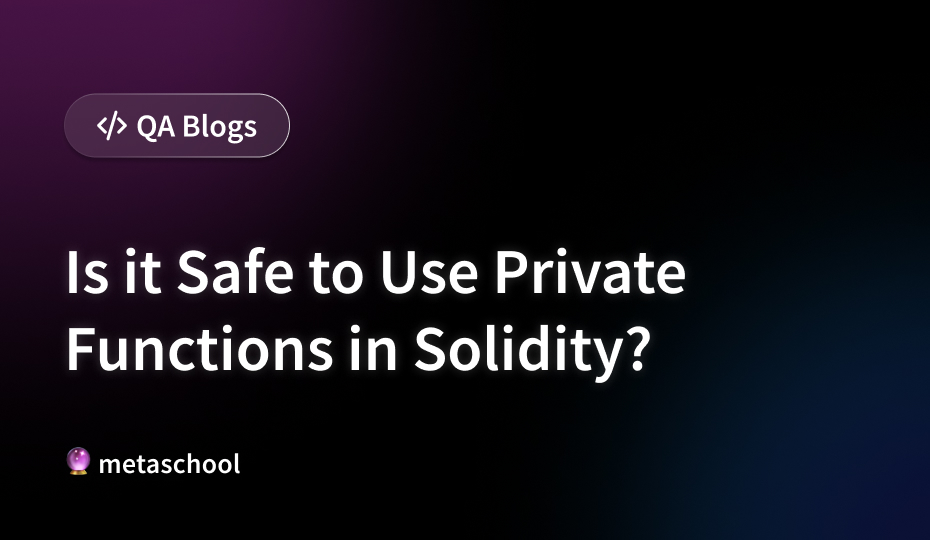Table of Contents
Solidity, the programming language used for developing smart contracts on the Ethereum blockchain, provides various visibility modifiers for functions, including private, internal, external, and public. These modifiers determine who can access the functions and data within a smart contract. When dealing with confidential data, developers often wonder if using private functions is a secure approach. In this article, we will explore the implications of using private functions for confidential data in Solidity and discuss alternative strategies for securing sensitive information.
Understanding Solidity Visibility Modifiers
Solidity visibility modifiers control the accessibility of functions and state variables within smart contracts. These modifiers include:
- Private: Functions and state variables marked as private are only accessible from within the same contract. They cannot be accessed or invoked externally or by derived contracts.
- Internal: Internal functions and state variables are accessible within the current contract and any contracts derived from it. They cannot be accessed externally.
- External: External functions are similar to public functions but can only be called externally, i.e., from outside the contract. They cannot be called internally or by other contracts.
- Public: Public functions and state variables can be accessed both internally and externally. They have no access restrictions.
Implications of Using Private Functions for Confidential Data
While private functions restrict access to the contract itself, they do not provide confidentiality for data stored within the contract. Smart contracts deployed on the Ethereum blockchain are visible to all participants, and the state variables’ values can be inspected by anyone. Therefore, relying solely on private functions to protect confidential data is not sufficient.
When using private functions for confidential data:
Limited Access within the Contract
Private functions ensure that only other functions within the same contract can call them. This restricts access to the confidential data to a certain extent, but it does not prevent the data from being read by other contracts or external parties.
Potential Security Risks
Private functions may still be susceptible to security vulnerabilities such as reentrancy attacks or unauthorized access through unexpected code paths. It’s essential to thoroughly audit the contract code and ensure that all possible attack vectors are addressed.
Lack of Encryption
Private functions do not encrypt the data stored within the contract. Even though they limit access to the data, it is still stored in plaintext on the blockchain, making it susceptible to unauthorized viewing.
🔥 Check this course out: Build a One Piece Personality dApp With Solidity
Alternative Strategies for Securing Confidential Data
To enhance the security of confidential data in Solidity smart contracts, developers can consider the following strategies:
Encryption
Encrypting sensitive data before storing it on the blockchain can significantly enhance confidentiality. Encryption algorithms such as AES or RSA can be used to encrypt the data, and only authorized parties with the decryption keys can access the plaintext.
Access Control
Implementing access control mechanisms within the smart contract can help restrict access to sensitive functions and data. Role-based access control (RBAC) or permissioned access schemes can be enforced to ensure that only authorized users can interact with the confidential data.
Off-Chain Storage
Consider storing sensitive data off-chain in a secure and encrypted database. Smart contracts can store references or hashes of the data on the blockchain for verification purposes while keeping the actual data off-chain where it is more secure.
Zero-Knowledge Proofs
Zero-knowledge proofs (ZKPs) enable parties to prove knowledge of a secret without revealing the secret itself. Using ZKPs, confidential data can be verified on the blockchain without exposing the data itself, providing a high level of privacy and confidentiality.
Conclusion
While private functions in Solidity restrict access to functions within the same contract, they do not provide sufficient security for confidential data stored on the blockchain. Developers should employ additional security measures such as encryption, access control, off-chain storage, or zero-knowledge proofs to protect sensitive information effectively.
By implementing a combination of these strategies, developers can ensure that confidential data remains secure and inaccessible to unauthorized parties, thereby enhancing the overall security and privacy of decentralized applications built on the Ethereum blockchain.
With careful consideration and implementation of appropriate security measures, developers can leverage the capabilities of Solidity while safeguarding sensitive information from unauthorized access or exposure.
Try it out, ask us questions, and tell us how it went by tagging Metaschool on Social Media.
Follow us on –
🔮Twitter – https://twitter.com/0xmetaschool
🔗LinkedIn – https://www.linkedin.com/company/0xmetaschool/
